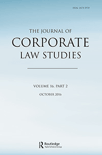
Journal of Corporate Law Studies
Scope & Guideline
Shaping the Future of Corporate Governance
Introduction
Aims and Scopes
- Corporate Governance and Director Responsibilities:
The journal emphasizes the legal frameworks governing the conduct of directors and corporate governance structures, exploring duties, responsibilities, and the implications of corporate purpose. - Environmental, Social, and Governance (ESG) Issues:
There is a strong focus on the intersection of corporate law and ESG factors, addressing how legal requirements influence corporate sustainability and social responsibility. - Comparative Corporate Law:
The journal often engages in comparative analyses between different jurisdictions, providing insights into how varying legal frameworks impact corporate practices globally. - Corporate Finance and Restructuring:
Research in this area includes the legal aspects of corporate finance, debt restructuring, and the implications of financial distress on corporate governance. - Institutional Theory and Corporate Law:
The application of institutional theory to corporate law is a recurring theme, investigating how institutional contexts affect legal frameworks and corporate behavior. - Investor Rights and Corporate Accountability:
The journal examines the balance between investor rights and corporate accountability, exploring themes of shareholder activism and stewardship.
Trending and Emerging
- Integration of ESG Metrics into Corporate Law:
There is a growing emphasis on the integration of ESG metrics into corporate law, reflecting a broader societal shift towards sustainability and corporate responsibility. - The Role of Technology in Corporate Governance:
Research is increasingly focusing on the implications of technology, such as artificial intelligence and digital governance, for corporate law and governance practices. - Reconceptualizing Directors' Duties:
Emerging discussions are focusing on redefining directors' duties in light of broader corporate purposes beyond shareholder interests, indicating a shift towards stakeholder capitalism. - Corporate Restructuring in Times of Crisis:
Recent publications highlight the legal frameworks surrounding corporate restructuring, particularly in response to financial distress, showcasing an adaptive approach to emerging economic challenges. - Innovative Financial Instruments and Corporate Law:
There is a trend towards exploring innovative financial instruments, such as SPACs and equity crowdfunding, and their regulatory implications within corporate law.
Declining or Waning
- Traditional Corporate Structures:
Research on traditional corporate structures, such as the rigid application of shareholder primacy, is declining as newer frameworks focusing on stakeholder interests gain traction. - Legal Formalism in Corporate Law:
There is a noticeable reduction in articles that adhere strictly to legal formalism, with a shift towards more pragmatic and interdisciplinary approaches to understanding corporate law. - Historical Analyses of Corporate Law:
Historical perspectives on corporate law are becoming less frequent, as contemporary issues and future-oriented analyses take precedence. - Focus on Purely Domestic Issues:
Research that solely addresses domestic corporate law problems without a comparative or international context is waning, reflecting a broader interest in global perspectives.
Similar Journals

AUSTRALIAN BUSINESS LAW REVIEW
Navigating the complexities of business law in Australia.Australian Business Law Review, published by Lawbook Co Ltd, is a premier peer-reviewed journal dedicated to the exploration and analysis of business law in the Australian context. With the aim of enhancing legal scholarship and practical understanding in this critical field, the journal addresses a wide range of topics including corporate governance, contract law, trade practices, and regulatory frameworks, making it an essential resource for legal practitioners, researchers, and students alike. The journal is recognized for its rigorous editorial standards and relevance in shaping discussions surrounding current legal issues, reflecting the complexities of the modern business environment. Although it does not operate on an Open Access model, the Australian Business Law Review remains a vital publication that contributes significantly to the discourse on business law, ensuring its readers stay informed about the latest developments and scholarly debates.
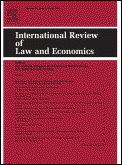
INTERNATIONAL REVIEW OF LAW AND ECONOMICS
Unraveling Complexities in Law and Economic Theory.The INTERNATIONAL REVIEW OF LAW AND ECONOMICS, published by Elsevier Science Inc, stands as a premier academic journal dedicated to the interdisciplinary exploration of law and economics since its inception in 1981. With an impressive convergence of insightful research and theoretical advancement, the journal encapsulates critical findings that bridge legal studies and economic principles. Ranked in the Q2 category for Economics and Econometrics and Finance, alongside a notable Q1 ranking in Law, it highlights its significant influence and high-quality scholarship within the academic community. The journal is indexed in Scopus, achieving commendable rankings which reflect its importance, ranking #188 out of 1025 in Law and #343 out of 716 in Economics and Econometrics. With no Open Access option specified, readers are encouraged to engage with the content through institutional access or subscription. This journal is essential reading for researchers, practitioners, and scholars looking to deepen their understanding of how legal frameworks intersect with economic theories, making it a vital resource in both fields.

Business and Human Rights Journal
Bridging the gap between business operations and human rights advocacy.Business and Human Rights Journal is a leading academic publication dedicated to the intersection of corporate responsibility and human rights, published by CAMBRIDGE UNIVERSITY PRESS. Since its inception in 2016, the journal has rapidly established itself as a vital resource for researchers, practitioners, and academics in the fields of Business and International Management, Industrial Relations, Law, and Sociology and Political Science, achieving a distinguished Q1 ranking in multiple categories in 2023. The journal's emphasis on contributive research and innovative perspectives fosters a critical dialogue on the responsibilities of businesses in ensuring human rights within their operations. With a robust impact factor and high Scopus rankings—placing it in the top 15% of Social Sciences Law and 25% of Sociology and Political Science—the Business and Human Rights Journal is essential reading for those engaged in advancing human rights in business practices globally.
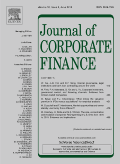
JOURNAL OF CORPORATE FINANCE
Pioneering Insights in the Corporate Finance LandscapeJOURNAL OF CORPORATE FINANCE, published by Elsevier, is a premier academic journal that represents the forefront of research in the fields of corporate finance, economics, and management strategies. With an impressive Q1 ranking across multiple categories and a 95th percentile standing in Scopus rankings, this journal is pivotal for advancing knowledge and fostering discourse among scholars, practitioners, and students globally. The Journal has been in continuous publication since 1994 and welcomes submissions that contribute to the understanding of corporate finance and related disciplines. Although it operates under a traditional access model, the Journal offers a rich repository of research outcomes pivotal for informed decision-making in corporate environments. Researchers and professionals looking to enhance their understanding of contemporary finance phenomena will find the JOURNAL OF CORPORATE FINANCE an invaluable resource.
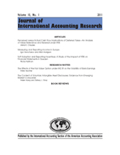
Journal of International Accounting Research
Navigating the Future of International AccountingJournal of International Accounting Research, published by the American Accounting Association, serves as a pivotal platform for scholars and practitioners in the fields of accounting and international business management. With an ISSN of 1542-6297 and E-ISSN 1558-8025, this esteemed journal has been contributing to the discourse on international accounting practices since its inception in 2007, covering insightful research up to 2024. Recognized in the Q3 quartile for Accounting and Q2 quartile for Business and International Management, the journal ranks among key players in its category, positioned within the 28th percentile for Accounting and the 23rd percentile for Business and International Management in Scopus rankings. By disseminating cutting-edge studies and rigorous analyses, the journal aims to bridge theoretical insights with practical applications, promoting a deeper understanding of accounting's role in the dynamic landscape of global business. Although it currently does not offer open access, its articles are highly valued for their contributions to the evolving challenges faced by accounting professionals around the globe.

Tydskrif Vir Die Suid-Afrikaanse Reg
Unpacking the Complexities of South African JurisprudenceTydskrif Vir Die Suid-Afrikaanse Reg, published by JUTA & CO LTD, is a vital scholarly journal contributing to the field of legal studies in South Africa. With an ISSN of 0257-7747 and E-ISSN of 1996-2207, this journal offers an academic platform for the publication of peer-reviewed articles addressing various facets of law, including case law analysis, legal theory, and regional legal practices. While currently positioned in the Q4 quartile of the 2023 Scopus rankings for Law, having a rank of #819 out of 1025, it provides an essential resource for research and discussion, aiming to elevate the quality of legal scholarship in the area. Even though it does not provide open-access options, its comprehensive coverage and commitment to advancing legal knowledge make it a significant asset for researchers, professionals, and students alike, particularly those interested in navigating the evolving landscape of South African law. The journal's content spans converged years from 2009 to 2024, ensuring a rich history of legal discourse and insight.

International Community Law Review
Contributing to Global Legal Scholarship.International Community Law Review, published by MARTINUS NIJHOFF PUBLISHERS, is a distinguished journal that contributes significantly to the fields of law and international relations. With an ISSN of 1871-9740 and an E-ISSN of 1871-9732, this journal serves as a vital platform for scholarly discourse on issues pertaining to international law, promoting a deeper understanding and engagement with complex legal frameworks and global challenges. Currently classified in the Q3 quartile for Law and Political Science and International Relations, the International Community Law Review ranks 475 out of 1025 in the Law category and 386 out of 706 in Political Science, reflecting a moderate impact in the academic community. Though it does not currently offer Open Access, the journal's extensive coverage from 2007 through 2024 ensures that it remains a relevant resource for researchers, professionals, and students. Published in the Netherlands, this journal aims to foster the development of international legal thought, support academic research, and facilitate discussions that shape modern international legal practices.
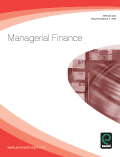
MANAGERIAL FINANCE
Advancing Knowledge in Managerial Decision-Making.MANAGERIAL FINANCE is a prestigious academic journal published by Emerald Group Publishing Ltd, focused on the areas of finance, management, and strategy. With an ISSN of 0307-4358 and an E-ISSN of 1758-7743, this journal has carved a niche for itself within the business and financial sectors, achieving a commendable Q2 category ranking across multiple domains, including Business, Management and Accounting, Finance, and Strategy and Management, as of 2023. The journal aims to provide a platform for insightful research and critical analysis while fostering an understanding of contemporary financial practices and theories. With its wide-ranging scope, it serves as a vital resource for researchers, professionals, and students alike, looking to stay abreast of the latest trends and challenges in managerial finance. The editorial board is committed to maintaining academic rigor, ensuring that articles published are of the highest quality and relevance to the field. By bridging the gap between theory and practice, MANAGERIAL FINANCE is an essential reference for anyone involved in financial decision-making and strategic management.

DUKE LAW JOURNAL
Pioneering insights for the legal landscape.DUKE LAW JOURNAL is a premier scholarly journal published by Duke University, dedicated to advancing the field of law through rigorous research and critical analysis. With an ISSN of 0012-7086 and an E-ISSN of 1939-9111, this distinguished journal has established itself as a vital resource for legal scholars, practitioners, and students alike. As a member of the top quartile (Q1) in Law for 2023 and ranking 267 out of 1025 in the Scopus database, the journal showcases high-impact articles that contribute to the contemporary discourse on legal theory, practice, and reform. While it does not currently offer open access, its rich archive since 1978 provides invaluable insights into significant legal developments in the United States and beyond. The DUKE LAW JOURNAL serves not only as a repository of knowledge but also as a forum for diverse perspectives, making it an essential tool for anyone engaged in the legal profession or academia.

International Journal of Law and Management
Transforming Legal Insights into Management StrategiesThe International Journal of Law and Management, published by EMERALD GROUP PUBLISHING LTD, stands at the intersection of legal studies and organizational management, making significant contributions to the understanding and analysis of legal frameworks in business. With an ISSN of 1754-243X and E-ISSN 1754-2448, this esteemed journal, based in the United Kingdom, has rapidly gained recognition in its field since its inception in 2008. It ranks in the Q2 category for Law and Q3 for Organizational Behavior and Human Resource Management, reflecting its pivotal role in fostering interdisciplinary discourse. The journal is indexed in Scopus, achieving a commendable rank of #85 in Social Sciences Law (91st percentile) and #96 in Business Management and Accounting (58th percentile), indicating its impact and relevance. Although it does not currently offer open access, the journal aims to provide a platform for insightful research that informs legal practices and enhances management strategies. As a vital resource for researchers, professionals, and students, the International Journal of Law and Management continues to broaden the horizons of law and management studies, supporting innovative perspectives and fostering academic excellence.